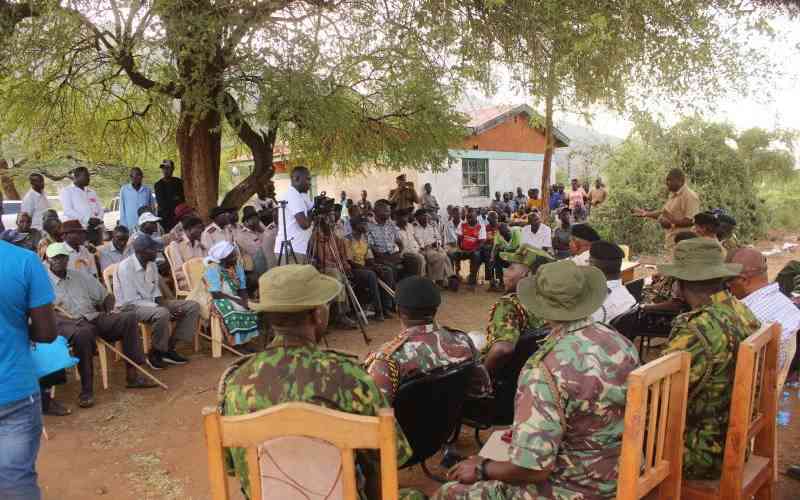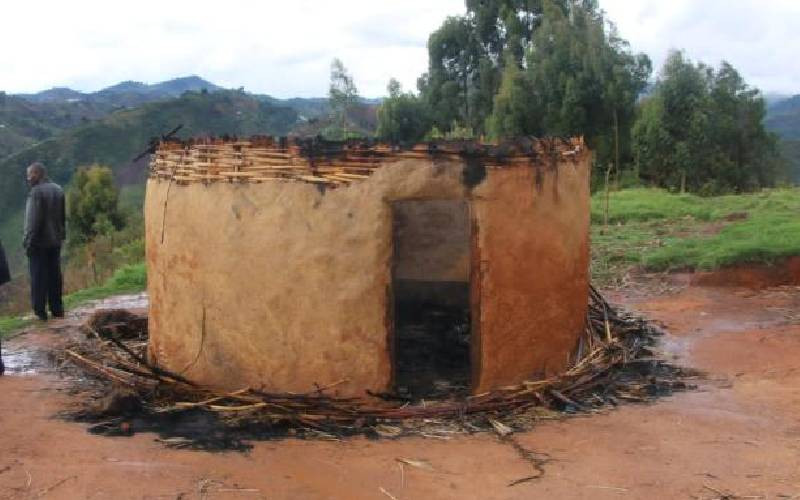By FAITH RONOH
For many years, the residents of West Pokot County had been keeping indigenous cattle. But changing weather patterns turned their fortunes upside down. They had to embrace crop farming. The trend is now geared for big change. This is after two biotechnology firms Amiran Kenya and African Boreholes Initiative (ABI) launched a farmer’s kit training centre in the region.
The training centre based at Kesogon area in the outskirts of Kapenguria town will boost food production in the cattle rustling prone region.
The initiative will see residents cut reliance on livestock for income and turn to agri-business farming.
It also seeks to sensitise farmers on innovative ways of farming using organic fertiliser. The move discourages use of synthetic fertiliser and other chemicals.
Speaking during the launch, Deputy Managing Director Amiran Kenya, Mr Yariv Kedar said the initiative targets farmers who can utilise small pieces of land to increase production.
In the programme, farmers will be treated to weekly training sessions on soil analysis, pest control and general crop husbandry. “The organic farmers
kit needs a small piece of land where several crops can be planted either in a green house or an open fi eld system,” said Kedar.
“With high amounts of antioxidants and nutrients found in organic input, farmers in this region will be in a position to fetch high market prices due to quality produce,” he added.
While advising farmers to shift from the usual cereal farming to horticulture, Kedar noted that crop yields in the region had decreased over time. The problem has been perpetuated by excessive use of commercial fertiliser that deprive soils of microbes.
Chemical damage
He attributed the slump in production to the regular application of chemicals like pesticides instead of using organic spray for pest control.
“Farmers who embrace organic farming will not only be able to earn an income but also feed their families on healthy food which translates to better health for them and their clients,” he said.
The initiative will see farmers trained on irrigation that ensure yields increase within a short time. The training centre sits on a one-acre land. It has various types of organic crops including carrots, onions, capsicum, kales and local greens commonly referred to managu among others.
During the launch, farmers were taken through farm management practices that should be adopted through organic farming. Crop rotation, irrigation and green house development were some of the practices that were advocated for as farmers were treated to a glimpse of various crops grown in the farm. ABI Chief Executive
Stay informed. Subscribe to our newsletter
Officer Mr Ben Yehuda said farmers Kit is specially formulated. It comprises of a unique set of organic fertiliser, soil nutrients and organic pesticides.
“By purchasing the entire kit that is made up of the highest quality farming inputs for a whole season, farmers will get the highest possible chances to succeed,” explained Yehuda. Yehuda also advised farmers to work with the Kenya Organic Agriculture Network (KOAN) in identifying potential markets for their produce.
“Apart from training, we will also be helping farmers identify market for their produce. KOAN for instance links farmers with market for their produce — both locally and internationally,” he noted.
West Pokot County Governor Mr Simion Kachapin welcomed the move saying it will initiate the much needed shift from overreliance on livestock to crop farming. Kachapin who offi cially launched the training center urged farmers in the region to embrace sustainable farming in order to attract investors thus boosting the economy.
“Planting variety of crops even on a small piece of land using organic fertiliser increases yields which means that as a farmer, you will earn more money from your produce. This is important in boosting the economy of this region,” said Kachapin.
Amiran has been partnering with USaid and Small Enterprise Assistant Funds to help uplift communities through agriknowledge skills.
 The Standard Group Plc is a
multi-media organization with investments in media platforms spanning newspaper
print operations, television, radio broadcasting, digital and online services. The
Standard Group is recognized as a leading multi-media house in Kenya with a key
influence in matters of national and international interest.
The Standard Group Plc is a
multi-media organization with investments in media platforms spanning newspaper
print operations, television, radio broadcasting, digital and online services. The
Standard Group is recognized as a leading multi-media house in Kenya with a key
influence in matters of national and international interest.
 The Standard Group Plc is a
multi-media organization with investments in media platforms spanning newspaper
print operations, television, radio broadcasting, digital and online services. The
Standard Group is recognized as a leading multi-media house in Kenya with a key
influence in matters of national and international interest.
The Standard Group Plc is a
multi-media organization with investments in media platforms spanning newspaper
print operations, television, radio broadcasting, digital and online services. The
Standard Group is recognized as a leading multi-media house in Kenya with a key
influence in matters of national and international interest.









